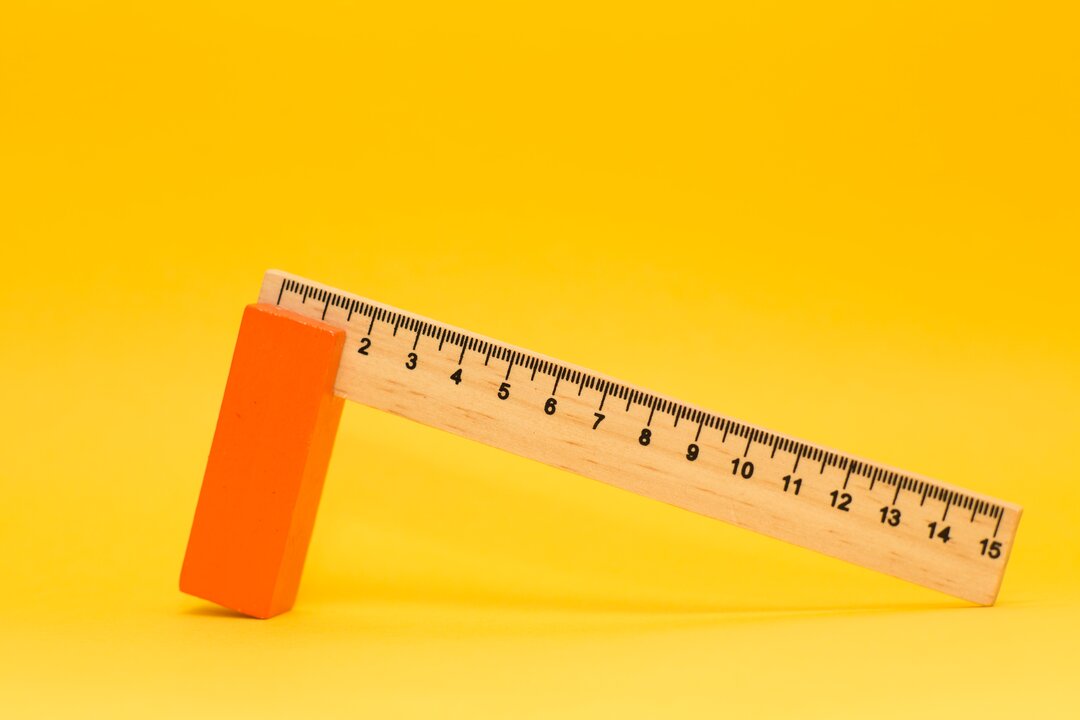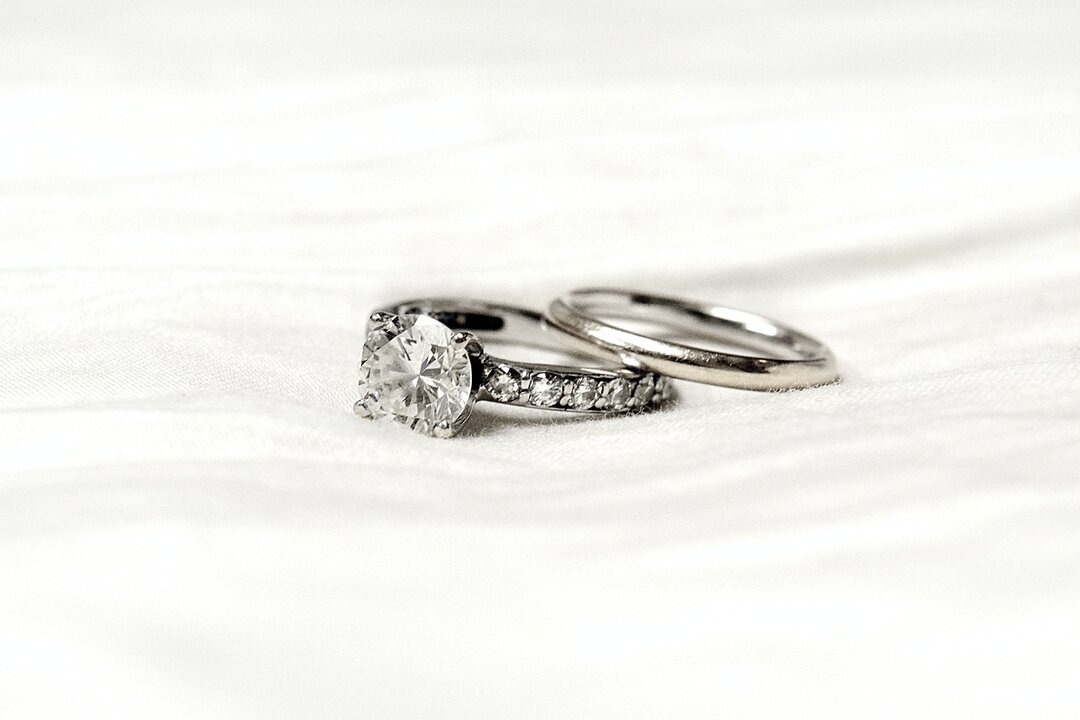- Expert advice/
- Getting engaged/
- Rings/
- The Ultimate Diamond Carat Size Guide
- Rings
The Ultimate Diamond Carat Size Guide
New to the world of wedding ring shopping? Find out everything you need to know with our diamond carat size guide from Zola.
Last updated February 5, 2024

Out of all the proverbial fish in the sea, you found the one—your person. The human you want to be with for the rest of your life. Congrats! Just like people come in all shapes and sizes, so do diamonds. Thankfully, gemstones are a bit easier to figure out. Although we can’t demystify your partner, our diamond carat size guide can help you choose the perfect diamond engagement ring.
Beyond the Diamond Carat Chart
Before getting into the nitty-gritty of diamond weight comparisons, it’s essential to familiarize yourself with a few diamond facts not generally included on a diamond weight chart.

Weight Is Not Equal to Diamond Carat Size
Yes, size matters. When someone gets engaged, we immediately want to see that stunner on their finger. The first thing we tend to notice is the size of the diamond engagement ring, and then our mind focuses on the shape, sparkle, and details surrounding the stone. Even though the tendency is to interchange the terms “size” and “carat,” they are vastly different.
The term carat refers to the weight of the stone, measured in one of two ways. Using metric terms, one carat equals 0.2 grams or 200 micrograms, also equal to 100 points. So, a two-carat oval diamond ring will equal 0.4 grams or 400 points. Above all, a diamond weight calculator measures carats, but doesn’t necessarily indicate how large a stone will look.
One-carat Diamond Prices Vary Depending on Other Factors
Of course, with great size comes great expenditure. The total weight of the stone is the determinant of price. Diamond market price charts also vary annually, as the cost of diamonds fluctuates from year to year.
Other factors—such as diamond cut, shape, color, and clarity (also known as “the four Cs” of diamonds)—impact the worth. A one-carat diamond price isn’t the same for each gemstone across the board. For example, a blemish-free, one-carat gem will be more expensive than the same size stone filled with imperfections. Although there are diamond price per carat calculators available, the gemstone must be considered in its entirety. In short, bigger doesn’t always equal better.
Diamond Carat Price Rises Exponentially With the Stone’s Weight.
When you spy that perfect 1.5-carat oval diamond ring in the case, don’t assume that a three-carat diamond will be twice the price. As the weight of a single diamond increases, so does the price per carat. Likewise, a one-carat ring won’t cost the same as four quarter-carat stones.
Thus, it’s important to note that carat weight is not the same as total carat weight. Many rings have side stones used to calculate the total carat weight of the diamond engagement ring itself. For example, a multi-stone ring may contain a half-carat center stone and two quarter-carat side stones. Although the total carat weight of the ring is one-carat, the value is not the same as a one-carat solitaire.
Things That Factor Into Diamond Carat Size
Not everything can be solved by consulting a diamond size chart. Millimeter (mm) sizing measures across the surface of a diamond and doesn’t take into account its depth. Consequently, there are other factors to consider, such as shape and how the facets are cut.
Diamond Shape
If you’re on the hunt for oval engagement rings, it’s best not to consult a marquise diamond size chart. Although their forms are somewhat similar, the shape of your gemstone will significantly affect the weight. So, instead of comparing apples to oranges, it’s best to use the same shape stone when factoring in diamond carat size comparisons.
So, how big is a half-carat diamond? To know how it will look on your hand, consider your favorite shapes. Diamond size charts are generally specific to the shape of the stone. Indeed, you want to determine the best carat size for the width of your fingers.
Diamond Cut
If you think that a diamond’s cut and shape are the same, think again. What you see from the top is the shape, and the geometry is the cut. Due to nature, several factors—such as imperfections and light reflection—must be taken into account when carving a stone.
If an area has several inclusions—or flaws—a gemstone cutter may cut the stone into the shape of a heart to better hide imperfections. In contrast, a less included area is ideal for a flawless, emerald-cut diamond. Size charts often don’t take the stone’s cut into account, and the depth of the gem is also a factor. For example, a shallow 1.5-carat round cut diamond ring may appear the same size as a two-carat round diamond ring with a deeper cut.
Diamond Carat Size Guide
Diamond Size Comparison by Carat Weight
Gemstones are three-dimensional. Therefore, you can’t simply add the width of two half-carat stones to get the dimensions for a full carat. For reference, a US nickel is almost two mm thick—1.95 mm, to be exact.
- 0.25 carat = 4.1 mm
- .5 carat = 5.1 mm
- 1 carat = 6.4 mm
- 1.5 carat = 7.4 mm
- 2 carat = 8.1 mm
- 3 carat = 9.3 mm
- 4 carat = 10.2 mm
- 5 carat = 11 mm

Diamond Carat Size Comparison by Shape
The slimming, little black dress is famous for a reason as it tricks the mind’s eye. That philosophy also works for diamonds. A long, thin marquise tends to look more substantial than a princess cut stone of the same weight. For reference, these are the approximate dimensions for one-carat stones.
- Marquise = 10.5x5 mm
- Pear = 8.5x5.5 mm
- Oval = 8x5.5 mm
- Emerald = 6.5x5 mm
- Heart = 6.7 mm
- Round = 6.4 mm round
- Cushion = 6.5x5.5 mm
- Asscher = 5.5 mm square
- Princess = 5.5 mm square
- Radiant = 6x5.5 mm
What Is the Average Carat Size for a Diamond Engagement Ring?
According to a recent study, the most popular weight for an average engagement ring is between 1 and 1.9 carats, with the average carat weight coming in with an actual carat size of around 1.08 carats. So, if you're looking to purchase an average carat size engagement ring, aim for a ring somewhere in that range.
Choosing the Right Carat Size for You
Figuring out how to pick engagement rings can be an intimidating task. One of the more daunting questions is “how do I decide the right carat size?” Two of the bigger factors that can help you decide what size is right for you are finances and lifestyle.
Finances
One of the first things you need to think about before purchasing an engagement ring is your budget. Understanding, and being realistic, about what you can afford can help you narrow down the right carat size for your partner. If you think they'd like a larger center stone—but you don't have the budget to pay for a larger diamond—consider a more affordable alternative, like a lab-grown diamond or a gemstone.
Lifestyle
Another thing to think about when choosing the right carat size for your partner? Their lifestyle. Buying an average-sized or smaller diamond is generally a good choice for an active person that plans to wear the ring daily—including during activities like hiking, traveling, or sports. However, if they’re more likely to only wear it on special occasions and/or want a center stone that’s sure to grab attention, then a larger carat weight engagement ring could be the better option.
FAQs
Can You Change Your Diamond's Carat Size?
Looking for a unique way to celebrate an anniversary or major life event? Altering the stone in your ring can be a wonderful expression. The cost comes down to the price of the new center stone and adjustments needed. A solitaire ring, for example, will require the least amount of adjustments. However, if you have a ring with multiple diamonds in its setting, adding a larger diamond carat size will require more changes to be made by jewelers—which would increase the price.
Is a 1 Carat Diamond Big Enough?
The average diamond size of engagement rings bought today are within the 1 to 2 carat weight range, so a 1 carat diamond is a great size—and should qualify as “big enough” for most people.
What is a Normal Size Diamond?
About half the rings bought in the US today are between 1 and 2 carats in weight. People on a budget usually stick with smaller diamonds since they’re more affordable—while people who are less concerned about affordability may opt for a larger diamond.
Keep in mind, it’s not just the carat that determines how big a diamond is; shape and cut can also impact how large a diamond appears.
Is a Higher or Lower Carat Diamond Better?
Is bigger really always better? A larger carat usually means a larger diamond, if that’s what you’re looking for. However, depending on the diamond clarity, color, shape, and cut, a smaller diamond may actually be of a higher quality. For example, a smaller carat diamond with better clarity and cut will have a more dazzling appearance than a large diamond with poor clarity.
Which diamond cut looks the biggest?
If you’re looking for crafty ways to make your ring appear larger, check out some of the alternative cuts that are offered. Different diamond cut styles, such as an oval diamond engagement ring, can make the gemstone appear larger than the actual carat size—and are often more affordable than the ever-popular round diamond engagement ring.
A Final Piece of Advice
We can chat all day about the weight, shape, and clarity of your diamond, and so can your jewelry person. But it’s very important to get documentation to go with your gemstone. Associations such as the Gemological Institute of America (GIA) and American Gem Society (AGS) have standards and grading systems for diamonds.
An engagement ring is a significant purchase. The proper documentation not only gives you confidence in your purchase, but is also vital for insurance purchases. If your diamond ring gets lost or stolen, your certificate can help replace it quickly.
A diamond carat size guide wouldn’t be complete without noting the nuances that characterize the gemstone industry. But no matter your choice of stone, rest assured that it will represent your love and commitment to your perfect catch.
- Expert advice/
- Getting engaged/
- Rings/
- The Ultimate Diamond Carat Size Guide
Find even more wedding ideas, inspo, tips, and tricks
We’ve got wedding planning advice on everything from save the dates to wedding cakes.